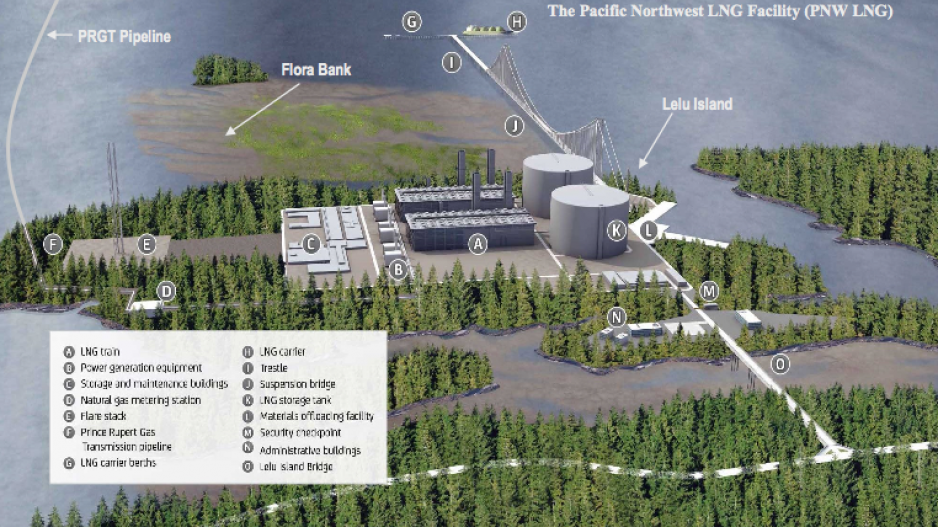Unless Lax Kw’alaams First Nation members living in Prince Rupert and Vancouver have very different views from those still living in and around Lax Kw’alaams village on an $11 billion liquefied natural gas plant, a $1.2 billion offer of cash and land in exchange for their support may not be enough.
Then again, the project does not hinge on the offer being accepted.
Lax Kw’alaams members have been voting in a series of membership meetings on the offer that includes $1.1 billion from Malaysian energy giant Petronas and $108 million worth of Crown land from the B.C. government to support the Pacific Northwest LNG project and associated pipeline.
Lax Kw’alaams Coun. Christopher Sankey told Business in Vancouver that his council cannot discuss the outcome of the membership votes until the final membership meeting is held in Vancouver May 12.
A spokesman for the Pacific Northwest LNG likewise said the company will not be commenting until the votes are over.
A number of media reports quoted one band member who said the offer was overwhelmingly rejected at the first membership vote on May 4.
According to two Lax Kw’aalams members – one in Prince Rupert, the other in the Lower Mainland – members rejected the offer at the first two meetings, held May 4 and 5 in Lax Kw’alaams village.
Neither wanted to be identified, they said, because they are both involved in an unrelated energy project in the area. Neither knew the outcome of the vote in Prince Rupert May 6.
A fourth membership vote takes place tonight (May 7), again in Prince Rupert, and two final meetings will be held May 11 and 12 in Vancouver.
Under the proposal, the Lax Kw’alaams First Nation would receive $20 million up front, $2 million during construction of the LNG plant, $5.6 million upon completion and annual payments starting at $13 million per year and rising to $50.5 million by year 40. The Lax Kw’alaams council has not yet decided just how much of that, if any, will be paid out in dividends to individual Lax Kw’alaams members, some of whom live outside of B.C.
The offer also includes 2,200 hectares of land in Prince Rupert Harbour (valued at $108 million) from the B.C. government, and potentially 1,000 more hectares, which are still up for negotiation.
Fears of damaging salmon habitat around Lelu Island, where Petronas wants to build a $11 billion liquefied natural gas plant, appear to the biggest concern among Lax Kw’alaams members.
Those fears resulted in the company revising its plans to include a suspension bridge to convey LNG to vessels moored offshore of Lelu Island to avoid damaging sensitive eel grass beds, which is important rearing habitat for juvenile salmon.
Despite those revised plans, Lax Kw’alaams members are still concerned about the potential damage to fish habitat.
Should the Petronas offer be rejected, that doesn’t mean the project can’t proceed.
Generally speaking, Robin Junger, a lawyer specializing in aboriginal and environmental law with McMillan LLP, said governments have a duty to consult First Nations and, if necessary, mitigate impacts on aboriginal rights. But that doesn’t give First Nations a veto over projects like pipelines.
Nor are companies obliged to strike revenue sharing agreements like the one Petronas has offered to the Lax Kw’alaams, although those agreements can go some way in getting their cooperation and participation.
“There’s no legal requirement for such deals,” Junger said. “The First Nation doesn’t have a veto, and there’s no requirement for government or a company to pay money as part of the duty to consult.”
First Nations can file for a judicial review, if the project is approved without their consent, but they would have to demonstrate how the government failed in its duty to consult and accommodate. Junger said courts rarely issue injunctions on a project while reviews are heard.
“The general principle is that, while a process is taken through judicial review, the permits are valid and it’s very rare for the court to issue an injunction saying a permit is suspended during a judicial review. It’s usually the opposite – an approval remains valid unless and until the courts say otherwise.”
The Pacific Northwest LNG project has not yet been granted a certificate from the Canadian Environmental Assessment Agency.




